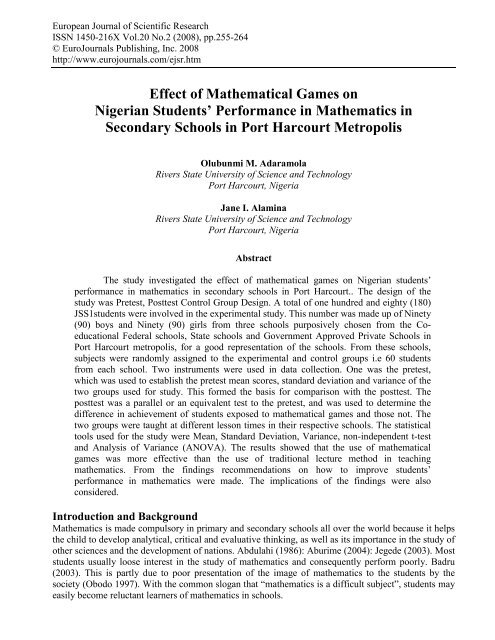European Journal of Scientific Research - EuroJournals
European Journal of Scientific Research - EuroJournals
European Journal of Scientific Research - EuroJournals
Create successful ePaper yourself
Turn your PDF publications into a flip-book with our unique Google optimized e-Paper software.
<strong>European</strong> <strong>Journal</strong> <strong>of</strong> <strong>Scientific</strong> <strong>Research</strong><br />
ISSN 1450-216X Vol.20 No.2 (2008), pp.255-264<br />
© Euro<strong>Journal</strong>s Publishing, Inc. 2008<br />
http://www.eurojournals.com/ejsr.htm<br />
Effect <strong>of</strong> Mathematical Games on<br />
Nigerian Students’ Performance in Mathematics in<br />
Secondary Schools in Port Harcourt Metropolis<br />
Olubunmi M. Adaramola<br />
Rivers State University <strong>of</strong> Science and Technology<br />
Port Harcourt, Nigeria<br />
Jane I. Alamina<br />
Rivers State University <strong>of</strong> Science and Technology<br />
Port Harcourt, Nigeria<br />
Abstract<br />
The study investigated the effect <strong>of</strong> mathematical games on Nigerian students’<br />
performance in mathematics in secondary schools in Port Harcourt.. The design <strong>of</strong> the<br />
study was Pretest, Posttest Control Group Design. A total <strong>of</strong> one hundred and eighty (180)<br />
JSS1students were involved in the experimental study. This number was made up <strong>of</strong> Ninety<br />
(90) boys and Ninety (90) girls from three schools purposively chosen from the Coeducational<br />
Federal schools, State schools and Government Approved Private Schools in<br />
Port Harcourt metropolis, for a good representation <strong>of</strong> the schools. From these schools,<br />
subjects were randomly assigned to the experimental and control groups i.e 60 students<br />
from each school. Two instruments were used in data collection. One was the pretest,<br />
which was used to establish the pretest mean scores, standard deviation and variance <strong>of</strong> the<br />
two groups used for study. This formed the basis for comparison with the posttest. The<br />
posttest was a parallel or an equivalent test to the pretest, and was used to determine the<br />
difference in achievement <strong>of</strong> students exposed to mathematical games and those not. The<br />
two groups were taught at different lesson times in their respective schools. The statistical<br />
tools used for the study were Mean, Standard Deviation, Variance, non-independent t-test<br />
and Analysis <strong>of</strong> Variance (ANOVA). The results showed that the use <strong>of</strong> mathematical<br />
games was more effective than the use <strong>of</strong> traditional lecture method in teaching<br />
mathematics. From the findings recommendations on how to improve students’<br />
performance in mathematics were made. The implications <strong>of</strong> the findings were also<br />
considered.<br />
Introduction and Background<br />
Mathematics is made compulsory in primary and secondary schools all over the world because it helps<br />
the child to develop analytical, critical and evaluative thinking, as well as its importance in the study <strong>of</strong><br />
other sciences and the development <strong>of</strong> nations. Abdulahi (1986): Aburime (2004): Jegede (2003). Most<br />
students usually loose interest in the study <strong>of</strong> mathematics and consequently perform poorly. Badru<br />
(2003). This is partly due to poor presentation <strong>of</strong> the image <strong>of</strong> mathematics to the students by the<br />
society (Obodo 1997). With the common slogan that “mathematics is a difficult subject”, students may<br />
easily become reluctant learners <strong>of</strong> mathematics in schools.

















